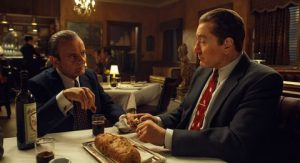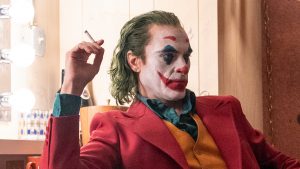Last night’s Oscars ceremony was on the brink of teetering off the edge and into the dustbin of history when suddenly, after a long string of tired and predictable winners took the stage to repeat virtually the same speeches they had been using all throughout awards season, the event righted itself and took a wild turn: with the shocking upset victory of Parasite in both the Best Director and Best Picture categories, the 92nd Academy Awards were able to make a groundbreaking advancement in movie history.
As we knew going into the ceremony (which got off to a bad start, with the frigid temperature and heavy rain-showers forcing the celebrities into the building at breakneck speed), the field of candidates was dominated by white men – though the long list of snubbed women directors still managed to attend the ceremony, as names embroidered on Natalie Portman’s dress. But in some categories, the few diverse nominees were able to sneak in some surprising wins: Matthew Cherry took home a long-awaited Oscar for the adorable animated short Hair Love, which celebrates natural black hair; and Taika Waititi became the first indigenous filmmaker to win an Oscar, claiming the award for Best Adapted Screenplay for his anti-fascist satire, JoJo Rabbit. Bong Joon-ho and the crew of Parasite also won Best Original Screenplay and Best International Film, giving the South Korean drama a total of four wins: the most of any film last night.
Joker, the dark and dour supervillain story that danced into the ceremony with a whopping eleven nominations, only walked out with two wins, both in categories where it was expected to win: Best Lead Actor went to Joaquin Phoenix, thus making him the second actor to win an Academy Award for his portrayal of the Clown Prince of Crime; and Best Original Score was presented to Hildur Guðnadòttir.
Elton John and Bernie Taupin’s joint work on “I’m Gonna Love Me Again” from the Elton John biopic Rocketman made them clear winners in the Best Original Song category, but the other contenders put on a good show: Idina Menzel, AURORA, and several Frozen II voice actresses from around the world sang “Into The Unknown”, while Cynthia Erivo and a chorus of back-up singers delivered a rousing rendition of “Stand Up” from Harriet. Then there was Randy Newman, with whatever the song was from Toy Story 4 (which somehow won Best Animated Feature in a year when Netflix’s Klaus was showing off the simple beauty of 2D animation). Three other musical numbers, unaffiliated with any film, were sprinkled throughout the ceremony: Janelle Monae and Billy Porter opened the night’s proceedings with a rousing, sparkly cover of “It’s A Beautiful Day In The Neighborhood”, which also featured dancers dressed as characters from some of the past year’s snubbed films, including Us and Midsommar; Eminem made a surprise appearance to perform “Lose Yourself” to an audience who clearly had no idea how to react – and those that did, namely Idina Menzel and Martin Scorsese, soon found themselves trending for their shocked and disturbed expressions; and finally, young Grammy-winner Billie Eilish performed a moving cover of “Yesterday” while the In Memoriam tribute video played – a video which, as expected, left out a couple of notable deceased celebrities.
Politics were briefly addressed, with Brad Pitt throwing jabs at the U.S. Senate in his acceptance speech for Best Supporting Actor in Once Upon A Time In Hollywood (one of only two awards the critical darling picked up, the other being Best Production Design), and Joaquin Phoenix making time for a warning about the dangers of climate change, and the importance of environmentalism. But many of the winners and presenters were more concerned with poking fun at their own business – there was no more scathing example of this than when James Corden and Rebel Wilson, two prominent members of the cast of the box-office flop and movie monstrosity Cats, ironically had to present the award for Best Visual Effects to 1917 while wearing cat-suits and making sarcastic puns.
The major categories were looking like a straight-up copy-and-paste of the Golden Globes winners (to nobody’s surprise, Renée Zellweger won Best Leading Actress for her transformative role as Judy Garland in Judy, while Laura Dern closed out her award-season romp with a Best Supporting Actress award for her fan-favorite role as a divorce lawyer in Marriage Story: Netflix’s only consolation prize for being snubbed and soundly defeated in every other category), right up until Best Director. The award had been expected to basically throw itself into the arms of Sam Mendes, whose continuous-take gimmick for 1917 has been a subject of much debate this awards season (and had, just moments before, won Roger Deakins a Best Cinematography Oscar), but there was also room for Quentin Tarantino to eke out a surprise victory: but it was Bong Joon-ho who claimed this award, and then led South Korea to its first ever Best Picture win – Parasite, a drama about class divides and economic crisis, also made history as the first non-English feature film to win the highest honor at the ceremony. Bong Joon-ho’s fanbase, who call themselves the “BongHive” on social media, celebrated the film’s success around the world, while Joon-ho himself finally got to have the drink that he kept asking for throughout the night.
Was it a perfect ceremony? No. The event was downright predictable for most of its extremely long runtime, and there was a tired aura in the air: perhaps brought on by the bad weather, or an unmemorable red carpet walk. But did it also break new ground and pave the way for a greater acceptance of international filmmaking in Hollywood? Let’s hope so.
Ceremony Rating: 7.9/10


